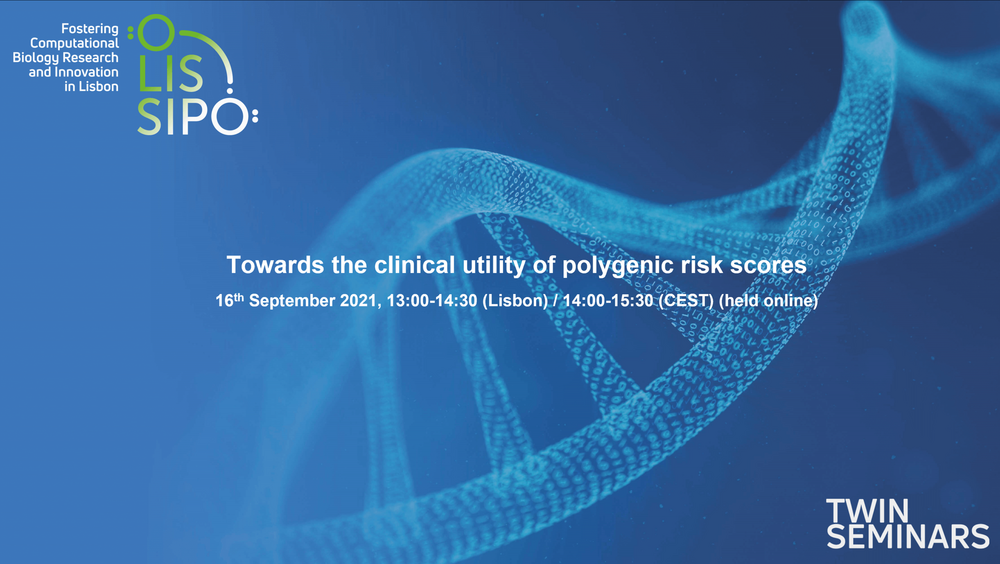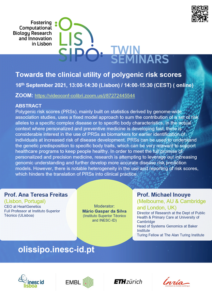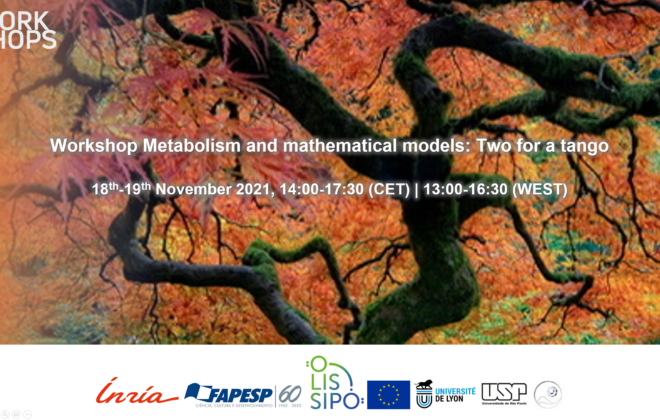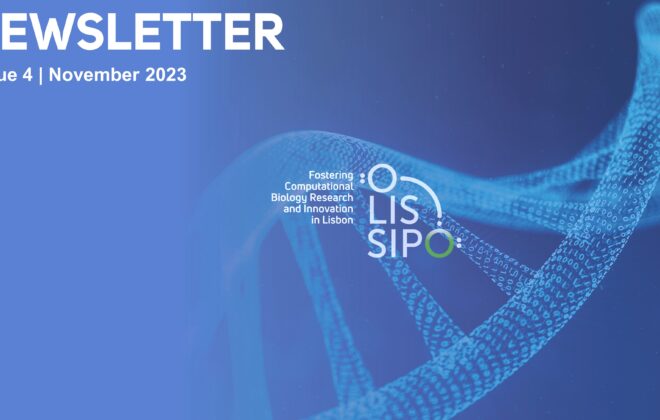
OLISSIPO Twin Seminar II
We are very enthusiastic to announce our second OLISSIPO Twin Seminar on Computational Biology.
The Twin Seminars will contribute to disseminate the scientific work and expertise of INESC-ID and all the Consortium that includes Inria, ETH Zürich and EMBL. These seminars will comprise two short presentations, one researcher from Lisbon and one from a twin international institution working on similar topics in Computational Biology. The seminars will be opened to everyone interested and will include a discussion to further promote the interaction between all the participants.
Towards the clinical utility of polygenic risk scores
16th September 2021
13:00-14:30 (WEST – Lisbon) / 14:00-15:30 (CEST) (held online)
Ana Teresa Freitas & Michael Inouye
INESC-ID | Instituto Superior Técnico | HeartGenetics & Baker Institute | University of Cambridge | Alan Turing Institute
Chair/Moderator: Mário Gaspar da Silva (Instituto Superior Técnico | INESC-ID)
ZOOM link: https://videoconf-colibri.zoom.us/j/87272445544.
No password or registration needed for this session.
Abstract
Polygenic risk scores (PRSs), mainly built on statistics derived by genome-wide association studies, uses a fixed model approach to sum the contribution of a set of risk alleles to a specific complex disease or to specific body characteristics. In the actual context where personalized and preventive medicine is developing fast, there is considerable interest in the use of PRSs as biomarkers for earlier identification of individuals at increased risk of disease development. In the field of well-being, PRSs can be used to understand the genetic predisposition to specific body traits, which can be very relevant to support healthcare programs to keep people healthy.
In order to meet the full promise of personalized and precision medicine, research is attempting to leverage our increasing genomic understanding and further develop more accurate disease risk prediction models. However, there is notable heterogeneity in the use and reporting of risk scores, which hinders the translation of PRSs into clinical practice.
In this talk, we will discuss the most recent developments on Polygenic Risk Score Reporting Standards (PRS-RS). Drawing on the input of experts in epidemiology, statistics, disease-specific applications, implementation and policy, a new comprehensive reporting framework was published defining the minimal information that is needed to interpret and evaluate PRSs, especially with respect to downstream clinical applications. Due to the growing market demand for genetic-based solutions to support the definition of well-being life plans, genetic testing laboratories are facing a number of challenges to guarantee the scientific robustness of tests that need to make use of PRSs. We will also discuss how the new EU IVDR regulatory framework is tailoring the use and development of genetic testing reporting based on PRSs.
Short Bios
Ana Teresa Freitas, Instituto Superior Técnico (IST), INESC-ID and HeartGenetics (Lisbon, Portugal)
Ana Teresa is CEO at HeartGenetics since 2013. She was co-founder/shareholder until 2020. She holds a PhD in Computer and Electronics Engineering. She has a diploma from the Advanced Management Program on Innovation and Entrepreneurship from Católica Lisbon – BES, School of Business and Economics. Her main expertise is in the areas of Computational Biology, Human Genetics, Health Informatics, Algorithms, Data Mining, and Data Science. As a researcher at INESC-ID, she was the head (2009-2014) of the Knowledge Discovery and Bioinformatics research group KDBIO. She also coordinated international projects under FP7 and many Portuguese National projects.
As a Full Professor at Técnico Lisboa, University of Lisbon, Department of Computer Science and Engineering, she created the Computational Biology course in 2005. She was a member of the Scientific Council at Instituto Superior Técnico (2012-2016), member of the Executive Board at the Department of Computer Science and Engineering (CFO) (2012-2016), coordinator of the Scientific Area of Programming Methodology and Technology at Department of Computer Science and Engineering (2017) and Vice-chair of the Board for 2017 and Board member (2010-2017) representing Portugal at ESFRI ELIXIR. She is also president of the School Assembly (2021-2024).
Michael Inouye, Baker Institute, University of Cambridge and Alan Turing Institute (UK)
Mike Inouye grew up in the Seattle area before beginning undergraduate study in 1999 at the University of Washington, where he later graduated with BSc in biochemistry and economics. During this time he was also introduced to computational genomics as the initial draft Human Genome was being finished, spending several years doing research in gene finding and protein structure prediction. He continued studying biochemistry as a graduate student at UCLA but returned to genomics in 2005 when he moved to the Wellcome Trust Sanger Institute in Cambridge, UK. While at Sanger, Mike completed his PhD with Prof Leena Peltonen and Prof Gert-Jan van Ommen and was heavily involved in the first wave of genome-wide association studies, especially the statistical methods thereof. He also led large-scale studies to integrate multi-omic data and identified a gene co-expression network related to the innate immune response and associated with diverse metabolic traits. In 2010, Mike moved to the Walter and Eliza Hall Institute in Melbourne on a postdoctoral fellowship to continue applying genomic expertise to problems in immunology. In 2012, he joined the faculty at the University of Melbourne where he built a research program in systems genomics with a particular focus on clinical and public health problems. In 2017, Mike and his lab were recruited to the Baker Institute and the Department of Public Health and Primary Care at Cambridge University, where he has a joint appointment.
We are looking forward to meeting you.






